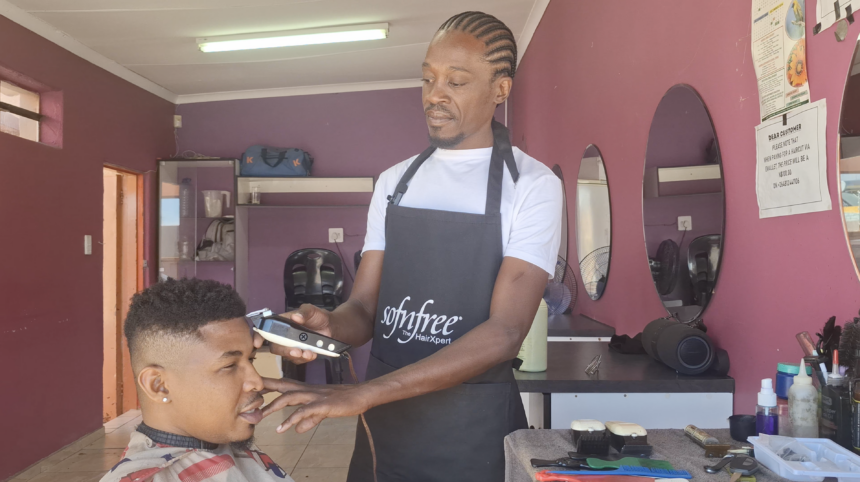The roles of hairdressers and barbers in society stretch far beyond the simple task of cutting and grooming hair.
These professionals, who have roots going back to ancient civilisations, have historically been esteemed figures — at times serving as religious leaders, surgeons, and skilled artisans.
Today, in countries including Namibia, they are essential members of the community, providing a service that goes hand in hand with style, confidence, and self-care.
Yet, despite their critical role, many barbers and hairdressers remain unsung heroes in Namibia, often undervalued and underappreciated.
The call of the clipper
Benedictus Hiskia Amapimbi, a 41-year-old barber, was first inspired to pursue the calling at the tender age of eight.
He fondly recalls watching an older man in his neighbourhood cutting hair, and noticing with awe, the satisfaction clients felt after a fresh cut.
This sparked his desire to master the craft, and by his early teens, he was cutting hair for friends and neighbours.
“I realized that barbering wasn’t just about cutting hair,” Amapimbi explains. “It was about making people feel good about themselves. That’s what really motivated me to keep going.”
However, the journey has not been without its challenges. One of the biggest hurdles for aspiring barbers in Namibia is finding the right location.
“You need good foot traffic to attract clients,” Amapimbi explained, adding that competition within the industry is also fierce. For him, the key to success lies in consistency, honing one’s skills, and building strong relationships with clients.
“Barbering is not just a job. It’s a profession,” he says. “We make people look good, and we help them feel good. A good haircut can boost someone’s confidence.”
Looking ahead, Amapimbi plans to expand his career by opening several salons and training the next generation of barbers.
“I want to pass on my knowledge and help others support themselves through this profession,” he says.
The hairdressing journey
Bilha Nambega, co-founder of African Beauty, has carved out a successful career in the beauty industry. Since starting her salon business in 2022, Nambega has expanded her team to seven employees, and the business now supports multiple families.
Her story of resilience is one many can relate to; after graduation, she struggled to find a job, and hairdressing became her side hustle. But over time, it evolved into something more.
“For me, it’s not just about earning an income,” Nambega says. “It’s about creating opportunities and empowering others.”
Despite the challenges — ranging from difficult clients to economic uncertainties — Nambega remains passionate about the beauty industry and encourages others to see it as a legitimate and rewarding career path.
“There’s often a perception that hairdressing and barbering are not respected professions,” she admits.
“But I believe if we start teaching young people these skills early on, like we do with sports or swimming, they could have successful careers by the time they are adults.”
Many barbers and hairdressers, especially those just starting out, face a significant amount of stigma. Often seen as low-status work, both industries are sometimes underestimated by society.
For Johannes Castanheira, a barber with over 20 years of experience, the lack of respect for the profession is frustrating but not a deterrent.
“Some people don’t see the value in what we do, but when they need a haircut, they come straight to us,” he says with a shrug. “It’s just part of the job, and you can’t let it bother you.”
Castanheira notes that barbers, like other professionals, shape people’s identities, boosting their confidence and self-esteem. His work has earned him high-profile clients, including the former president of Namibia.
For him, barbering is a lifelong passion — one that requires perseverance, dedication, and a willingness to evolve.
“You have to keep pushing yourself to be better,” Castanheira explains. “Barbering has shaped who I am today.
For Anna Nankudhu, a young hairdresser who started braiding hair at school, the profession is deeply personal.
“When I was younger, I didn’t see hairdressing as a career,” she says. “But as I grew older, I realised that this is my passion, and it’s something I’m good at.”
Nankudhu balances her work with family life, despite the time-management challenges that come with running a successful business.
Her advice to aspiring hairdressers? “Focus on one thing at a time. If it’s hairdressing, give it your all. Don’t let the opinions of others bring you down.”
While many barbers and hairdressers in Namibia face challenges — whether it’s tough competition, financial instability, or societal stigma — they remain an indispensable part of the community. Their work is not just about styling hair; it’s about transforming lives, one haircut at a time.
“It’s about more than looking good,” says Amapimbi. “A good haircut helps people feel good, both inside and out. We make a difference.”
It’s time that the contributions of barbers and hairdressers are recognised for the invaluable service they provide, not just in terms of appearance but in fostering confidence, self-worth, and community spirit.
In Namibia, the barbershops and beauty salons are more than places to get a trim — they are sanctuaries of self-expression and empowerment. Whether you’re sitting in the chair for a quick haircut or a full grooming experience, these unsung heroes play a vital role in shaping not just how we look, but how we feel.


